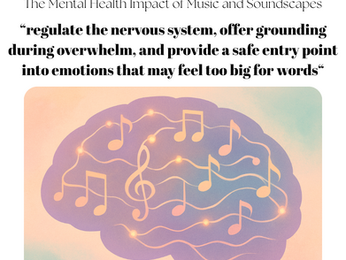Search


What is an anchor in mental health?
An anchor is a reliable cue, practice, or relationship that helps you steady your nervous system when emotions surge. Think of it as the thing you reach for when stress pulls you off course, a simple touchstone that brings you back to the present with a little more safety and choice.
Deborah Marks
Oct 7, 20254 min read


Micro-volunteering for Mental Health
We often think volunteering needs a whole Saturday, a roster, or a uniform. Micro-volunteering flips that story. It is bite-sized care you can offer in minutes, slotted between school drop off and emails, or while the kettle boils. These small acts may be short, but they are still powerful, and they can brighten your day while helping someone else.
Deborah Marks
Oct 1, 20253 min read


Move Your Mood: How Physical Activity Supports Mental Health
We often think of exercise as a body goal. In therapy, I see it as a nervous system tool. Regular physical activity signals safety to the brain, steadies the stress response, and builds a felt sense of capability. You do not need a gym membership or perfect routines. Small, repeatable bouts of movement can shift mood, improve clarity, and support sleep.
Deborah Marks
Sep 24, 20253 min read


Self-Reflection for Mental Health
If life feels busy and noisy, reflection offers something rare: a quiet room inside your day. Thoughtful reflection helps you notice what you feel, understand why you react the way you do, and choose your next step with clarity. It is simple, accessible, and surprisingly powerful when you make it part of everyday life.
Deborah Marks
Sep 22, 20253 min read


Nature and Mental Health: Why Green Spaces Are Healing
A growing body of research shows that green and blue spaces soothe the stress response, lift mood, and support recovery. One landmark study found that hospital patients with a view of trees recovered faster than those facing a brick wall, showing that a small change in environment can lead to measurable benefits.
Deborah Marks
Sep 19, 20254 min read


Political Violence and the Strain on Our Mental Health
When political violence becomes front-page news, many of us feel shaken, unsafe, and even disoriented. The recent assassination of Charlie Kirk, fatally shot while speaking at Utah Valley University on September 10, 2025, drives home how fragile civic life and public discourse can be in times of extreme division.
Deborah Marks
Sep 16, 20254 min read


The Psychology of Values: Unlocking Better Mental Health
Every person has a unique set of values that guide their choices, shape their relationships, and influence their sense of purpose. These values are not just abstract beliefs; they serve as the foundation of our wellbeing. When our daily lives align with what we value most, we tend to feel more balanced, fulfilled, and mentally healthy. When there is a disconnect, however, stress, anxiety, and dissatisfaction often arise.
Deborah Marks
Sep 12, 20253 min read


Community and Mental Health
In a world where many people feel increasingly isolated, the role of community in supporting mental health has never been more important. Whether it’s family, friends, local groups, or professional networks, the sense of belonging and connection that community provides can act as a powerful buffer against stress, anxiety, and depression.
Deborah Marks
Sep 9, 20252 min read


Guilt and Mental Health
Guilt is one of the most powerful emotions we experience. At its core, it arises when we believe we have done something wrong, let someone down, or failed to meet our own standards. In small doses, guilt can be constructive, guiding us to repair relationships or make better choices. However, when guilt becomes excessive, misplaced, or chronic, it can weigh heavily on our mental health.
Deborah Marks
Sep 4, 20253 min read


The Intersection of Climate Anxiety and Mental Health
Australia is no stranger to extreme weather. In recent years, bushfires, floods, and prolonged droughts have left lasting scars on communities and individuals alike. Beyond the physical destruction, these events are fuelling a growing phenomenon known as climate anxiety, a sense of fear, hopelessness, or overwhelm about the state of our planet and its future.
Deborah Marks
Sep 2, 20252 min read


The Mental Health Impact of Music and Soundscapes: Linking Neuroscience with Therapy Practice
Think back to a time when a song gave you goosebumps, or the sound of waves instantly calmed your mind. Music and soundscapes have a profound ability to shape our emotions, focus, and even our physical state. But this isn’t just a pleasant coincidence; neuroscience shows us that sound directly influences the brain in ways that can support healing and emotional wellbeing.
Deborah Marks
Aug 28, 20253 min read


The Rise of “Toxic Positivity”: When Good Vibes Become Harmful
In today’s culture of Instagram quotes, TikTok trends, and quick-fix self-help advice, positivity is often portrayed as the cure for everything. While optimism has many proven benefits, there is a growing problem when positivity becomes forced, dismissive, or used to suppress genuine emotions.
Deborah Marks
Aug 25, 20253 min read


Impacts of Hormones on Mental Health
Hormones are chemical messengers that influence nearly every system in the body, including the brain. While they are most often associated with physical functions such as growth, metabolism, or reproduction, hormones also play a significant role in shaping our moods, emotions, and mental wellbeing. Understanding this connection can help us better manage stress, recognise changes in our mental health, and seek support when needed.
Deborah Marks
Aug 19, 20253 min read


Where to Find Help for Mental Wellbeing
Mental wellbeing is a crucial aspect of overall health. Just like physical health, mental health requires attention and support. Many individuals experience mental health challenges at some point in their lives, and finding help is essential. This guide will explore various avenues for seeking mental health support, including professional services, community resources, and self-help strategies.
Deborah Marks
Aug 13, 20254 min read


Understanding Depression: What It Is and How to Find Support
Most of us experience low moods from time to time, especially during challenging periods of life. However, depression is more than occasional sadness; it is a diagnosable mental health condition that affects how we think, feel, and function. It can interfere with work, relationships, and even our physical health.
Deborah Marks
Aug 6, 20253 min read


What Is Self-Esteem? Understanding Its Role in Mental Health and Wellbeing
Self-esteem is the way we perceive and value ourselves. It’s shaped by our beliefs, experiences, relationships, and the messages we’ve received over time. At its core, self-esteem influences how we treat ourselves, how we let others treat us, and how we respond to life’s challenges.
Deborah Marks
Aug 5, 20252 min read


How Alcohol Affects a Person’s Mental Health
For many Australians, having a drink is part of how we relax or connect socially. But when alcohol use becomes regular or excessive, it can start to take a toll on more than just the body. It deeply affects the brain, mood, emotions, and relationships, often in ways that aren’t obvious until things feel overwhelming.
Deborah Marks
Jul 31, 20253 min read


Supporting Student Wellbeing: The Rise of School-Based Mental Health Programs in Australia
Mental health support for children and teens is no longer just a home or clinic issue, it’s becoming a vital part of the school environment too. Across Australia, school-based mental health programs are gaining momentum, offering practical, early support where students spend most of their time.
Deborah Marks
Jul 8, 20253 min read


The Role of Gratitude, Forgiveness, and Positive Psychology in Healing
Emotional healing is often associated with processing pain, trauma, or loss, but it can also be about building inner resources that promote resilience and wellbeing. At Hope Prevails, we see the profound effects that gratitude, forgiveness,
and principles of positive psychology can have on a person’s mental health.
Deborah Marks
Jun 24, 20253 min read


Therapy for Carers and Support Workers
Whether you’re an informal carer looking after a loved one or a professional support worker helping others in their daily lives, your role is deeply meaningful, but also emotionally demanding. Over time, the constant focus on others’ needs can lead to burnout, emotional exhaustion, and compassion fatigue.
Deborah Marks
Jun 20, 20252 min read